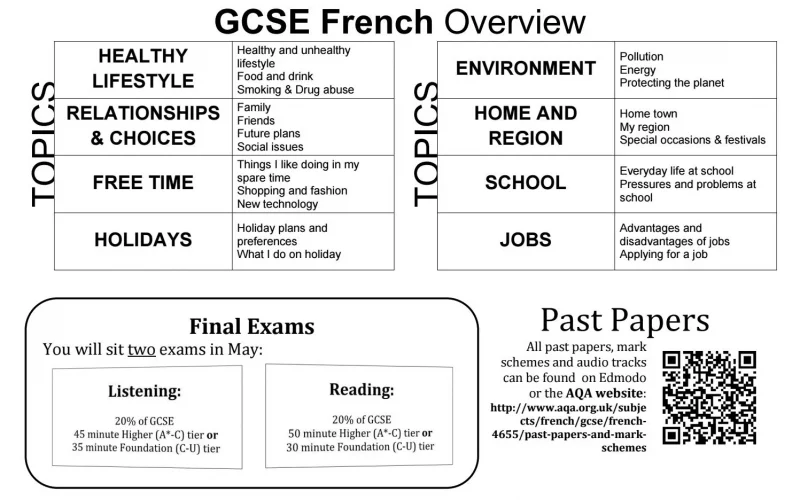One challenge most students face is the fear of scaling through the British GCSE French exam. According to Statista, there were approximately 122,746 high school students in England taking French at the GCSE level, compared with 107,488 taking Spanish and 34,966 taking German.
This explains the importance of GCSE French and it’s popularity. So, it’s not an exam you can just skip as a high school student. It’s expedient to prepare well if you must pass.
This is where GCSE French past papers come into play. The GCSE French past papers are a compilation of past questions asked in previous years and their answers.
Although questions are not repeated verbatim, they can serve as a guide and a hint as to what you should expect.
It doesn’t matter if you are a student gearing up for your GCSE French exam or an educator aiming at helping his student, having GCSE French past papers handy is of great importance.
This article provides a detailed insight on everything you need to know about the GCSE French exam, including how the past papers can help you prepare better and practical tips for effective usage of the past papers.
Carefully read through. Meanwhile, the table of contents below will help with easy navigation.
Table of contents
GCSE French Past Papers Contribute to Better Preparations For GCSE French Exams
Past papers play a crucial role in enhancing preparation for GCSE French exams. Here’s an extensive look at how they contribute to better exam readiness:
Familiarity with Exam Format:
GCSE French past papers expose students to the actual format and structure of the exam. It includes the distribution of marks across different sections, the types of questions asked, and the time allocated for each team.
Familiarity with the format reduces anxiety during the exam, as students know what to expect.
Understanding Question Patterns:
As a student, past papers provide insights into the patterns of questions that are frequently asked. This will help you identify common question types and formulate effective strategies for tackling them.
For example, they can recognize whether the exam focuses more on reading comprehension, writing, listening, or speaking skills.
Content and Vocabulary Mastery
Come to think of it, how do you expect to fail an exam if you have already mastered the vocabulary and jargon? It’s very difficult for you to fail!
That’s why it won’t be easy for you to fail the GCSE French exam if you truly prepared with the GCSE Past papers.
The truth is, going through past papers exposes students to the range of vocabulary and themes likely to appear in the exam.
This encourages them to review and learn essential language related to various topics. You can reinforce your understanding and retention by repeatedly encountering these words and phrases in different contexts.
Time Management Practice:
Time management is a crucial skill during exams. Past papers allow students to practice allocating their time appropriately to each section.
Students can refine their ability to complete all areas within the given time by setting a timer and attempting the form under simulated exam conditions.
Identification of Weak Areas:
Working on past papers helps students identify weaker areas. They can analyze their performance, review incorrect answers, and understand the reasons behind their mistakes.
This self-assessment guides targeted revision, enabling them to focus on the topics that need more attention.
Building Confidence
As students practice with past papers, they gradually build confidence in their abilities. The sense of accomplishment from completing reports successfully boosts self-assurance, which is essential for performing well in the actual exam.
Application of Knowledge
Past papers provide a platform for students to apply the knowledge they’ve acquired in a practical context.
It’s one thing to study grammar rules and vocabulary lists but quite another to use that knowledge to answer questions, write coherent essays, or comprehend written and spoken passages.
Adaptation to Exam Conditions:
Experiencing the pressure of timed exam conditions is invaluable. Past papers allow students to adapt to the stress and time constraints they’ll face during the exam. This experience helps reduce nervousness and improves focus under pressure.
Read Also: Can you Retake or Resit A-Levels?
What Are Some Effective Strategies For Utilizing GCSE French Past Papers?
Effective utilization of GCSE French past papers can significantly improve exam performance. Here are some strategies to consider:
Start Early and Gradually:
Before the exam, incorporate past papers into your study routine. This is one of the effective strategies for utilizing GCSE french past papers.
Doing this allows you to pace yourself and avoid last-minute cramming. Start with a few documents and gradually increase the number as you get closer to the exam.
Understand the Marking Scheme:
Another effective strategy to use when studying GCSE French past papers is trying to understand the marking scheme. Review the marking scheme or model answers, if available, before attempting a past paper.
This helps you understand what examiners are looking for and how marks are allocated for different sections and types of questions.
Simulate Exam Conditions:
Create an environment that mirrors the exam conditions. Set a timer, sit at a quiet desk, and eliminate distractions.
This practice familiarizes you with the pressure and time constraints you’ll face during the exam.
Sectional Focus:
If you’re weaker in certain sections, practice those more intensively. For instance, if listening comprehension is challenging, focus on completing multiple listening comprehension exercises from past papers to improve your skills.
Review and Analyze:
After completing a past paper, review your answers. Identify the questions you struggled with and understand why you made mistakes. Was it a lack of vocabulary, misinterpretation, or poor time management? This analysis guides your future study efforts.
Consistent Practice
Regular practice is critical. Aim to work on past papers at least a few times a week. Consistency builds familiarity with different question types, improves your skills, and boosts confidence.
Vocabulary Review
Make note of unfamiliar words or phrases encountered in past papers. Create flashcards or a vocabulary list to review and memorize these terms. This enhances your language skills and comprehension.
Time Management Skills
During practice, pay attention to the time you allocate to each section. Strive to complete the paper within the designated time. If you consistently run out of time, adjust your strategy to improve your time management skills.
Read Also: GSCE 2023 Exam Timetable: Your Ultimate Guide
GCSE French Past Papers Question Structure
French past papers include various question types that assess different language skills. Here are insights into the kinds of questions commonly found in these papers:
Listening Comprehension:
- Multiple Choice: Listen to a passage or conversation and choose the correct answer from a set of options.
- Fill in the Blanks: Complete sentences or a transcript by filling in missing words or phrases you hear.
- True/False Statements: Determine whether statements related to the audio are true or false.
Reading Comprehension:
- Multiple Choice: Read a text and select the appropriate answer from a list of choices.
- Match Statements: Match statements or questions with specific sections or paragraphs of the text.
- True/False/Not Given: Decide if statements about the text are true, false, or not given according to the information provided.
Writing:
- Short Answers: Respond to questions or prompts with brief answers demonstrating your understanding of the topic.
- Descriptive Writing: Use appropriate vocabulary and grammar to describe a picture, event, or scenario.
- Opinion or Argumentative Essays: Express your opinion on a given topic or present arguments for and against a particular issue.
Speaking:
- Role-plays: Engage in simulated conversations where you’re given a role and situation to respond to.
- Presentation: Speak on a given topic for a specific duration, demonstrating your ability to express ideas clearly.
- Discussion: Discuss with the examiner, expressing your views and responding to questions.
Translation:
- Translate Sentences: Translate sentences or short passages from English to French while maintaining accuracy and appropriate vocabulary.
Grammar and Vocabulary:
- Fill in the Blanks: Complete sentences with the correct verb forms, prepositions, or vocabulary words.
- Sentence Transformation: Rewrite sentences with specific instructions, such as changing from direct to reported speech or using a particular tense.
Cultural Awareness:
- Questions on Texts: Answer questions that require you to understand and interpret cultural references in texts.
- Comparison: Compare cultural practices, traditions, or events mentioned in the materials.
Summarization:
- Summarize Texts: Summarize a given text or passage, capturing the main points and key information.
Grammar and Language Manipulation:
- Rearrange Sentences: Rearrange jumbled sentences to form coherent paragraphs.
- Identify Errors: Identify and correct sentence errors related to grammar, vocabulary, or syntax.
Extended Responses:
- Extended Writing: Write longer essays, letters, or reports that require you to express ideas in detail and coherently.
It’s important to note that these question types’ distribution may vary across exam boards and years.
Familiarizing yourself with these types of questions and practicing each can help you feel more prepared and confident when tackling GCSE French past papers.
Read Also: Top 10 Best GCSE Maths Revision Websites | 2024 Ranking
Specific Time Management Strategies Students Should Consider When Working With GCSE French Past Papers
Effective time management is crucial when working on GCSE French past papers. Here are some specific techniques that students should consider:
- Set Realistic Time Limits: Before you start a past paper, allocate the same amount of time you’ll have in the actual exam for each section. This helps you practice working within the time constraints and improves your pacing.
- Divide time Proportionally: If the exam is divided into different sections with varying marks, allocate your time proportionally based on the marks allocated to each section. This ensures you’re dedicating more time to higher-mark units.
- Stick to Time Limits: While practicing, strictly adhere to the time limits you’ve set for each section. If you run out of time for a particular area, move on to the next one. This simulates the pressure of the real exam and helps you manage time more effectively.
- Practice Under Exam Conditions: Create an environment replicating exam conditions as closely as possible. Sit at a desk, avoid distractions, and set a timer. Practicing in this manner helps you become accustomed to the pressure and distractions of the actual exam.
- Warm-Up with Timed Sections: Start your practice session with a timed warm-up activity. This could be a short reading comprehension or writing exercise. It gets your brain accustomed to working efficiently under time constraints.
- Mark Unanswered Questions: If you’re stuck on a question and can’t find an answer quickly, mark it and move on to the next. Save time on a single question, which might affect your performance in other sections.
- Review and Reflect: After completing a past paper, analyze how you managed your time in each section. Did you spend too much time on specific questions? Did you rush through others? Use this reflection to adjust your time management strategy for the next practice session.
- Build Time Awareness: Develop a sense of how much time you should spend on each question based on its complexity and marks. For instance, allocate less time to a question with fewer marks.
How Can Educators Integrate The Use of GCSE French Past Papers Into Their Teaching Method
Educators can play a vital role in enhancing their students’ learning experience by integrating past papers into their teaching methods. Here’s how they can do so effectively:
- Introduction and Explanation: At the beginning of exam preparation, introduce the concept of past papers to students. Explain their importance in understanding the exam format, assessing knowledge, and practicing exam skills.
- Progressive Integration: Start by incorporating past papers as supplementary exercises. As the exam date approaches, they gradually increase their prominence in the curriculum, making them a regular part of study sessions.
- Topic-Specific Practice: Align past paper sections with the topics you’ve covered in class. For instance, assign related questions from past papers to reinforce learning after teaching a particular grammar concept.
- Pre-Teaching and Predictions: Before students attempt a past paper, discuss the questions they can expect based on the topics covered. This pre-teaching primes students and boosts their confidence.
- Guided Practice: Provide students with guided practice sessions where they work through past paper questions together. This allows you to explain strategies, address doubts, and emphasize critical thinking.
- Independent Practice: Assign past papers as homework or in-class assignments. Please encourage students to attempt them individually, mimicking exam conditions as closely as possible.
- Self-Assessment: Provide marking schemes or model answers for students to self-assess their work. This enables them to understand the criteria for scoring and helps identify areas that need improvement.
- Peer Review: Encourage students to exchange their answers with classmates for peer review. This promotes collaborative learning, allows students to learn from each other’s mistakes and fosters discussion.
- Individualized Feedback: Review students’ responses and provide personalized feedback on areas of improvement. Highlight mistakes and offer guidance on approaching similar questions in the future.
- Time Management Workshops: Conduct workshops on time management techniques using past papers. Provide students with strategies to allocate time efficiently for different sections.
Read Also: 10 Effective Brain Foods for Studying During Exam Season in 2024
Frequently Asked Questions about AQA GCSE French Past Papers
Past papers are previous years’ exams used for practice and preparation before the GCSE French exams.
Past papers help you understand the exam format, practice different question types, and identify areas for improvement.
No, but they give you an idea of common question patterns and topics, helping you prepare effectively.
They help you familiarize yourself with exam conditions, manage time, and refine your skills through practice.
While recent papers are essential, practicing past papers from different years helps you tackle various question styles and challenges.
Conclusion
GCSE French past papers serve as invaluable tools for comprehensive exam preparation. By offering insights into exam formats, fostering content mastery, honing time management skills, and building confidence, past papers empower students to approach their exams with readiness and assurance.
Incorporating past papers into study routines equips learners with the necessary skills to excel in their GCSE French journey and succeed in their language proficiency goals.
References
- evisionworld.com: GCSE French past papers.
- aqa.org.uk: GCSE French past papers.






